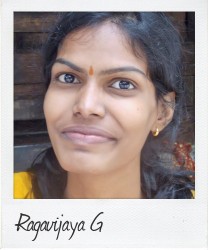“Finding home outside your comfort zone”
November 8th, 2016 It is one thing to know that India is large, but for Ragavijaya G, 23, a Correspondent living in Delhi, recognising seven major religions, 29 states, 780 languages and 1.3 billion people brought new understanding of the range of diversity in the one nation that is called India.
It is one thing to know that India is large, but for Ragavijaya G, 23, a Correspondent living in Delhi, recognising seven major religions, 29 states, 780 languages and 1.3 billion people brought new understanding of the range of diversity in the one nation that is called India.
Until last year when I was living in Tamil Nadu, the southernmost state of India, I did not know that I was living in a nation which is extremely diverse in every possible way.
Even in July, 2016, when I had to move to New Delhi, the capital city of India for higher studies, I was quite unaware of what was in store for me. A few months back, for the very first time in my life, I came out of Tamil Nadu to New Delhi. The very thought of the fact that New Delhi is around 2000 km away from my hometown made me anxious and apprehensive.
Moving from Tamil Nadu to Delhi almost felt like moving to another far-off country. That is the thing about India. You step out of one state and move to another, and you will have to face a new set of culture, traditions and people. When I first came to Delhi, I was overwhelmed by an unknown language, Hindi, the language which the majority of the north Indians speak. I also faced a new set of people in the state of Haryana, an entirely new type of cuisine and many other new things.
The differences in eating habits between the north Indian people and south Indian people was something that struck me so hard in the first few weeks. North Indian cuisine contains more dishes like naan and chapathi, whereas south Indian cuisine contains more rice-based items. Initially, I lost my appetite and was struggling to get accustomed to new eating habits. The initial phase of unsettled-feeling, combined with food items served every day that were so alien to me, took away my sense of belonging to the new place and I felt emotionally naked most of the times. Apart from all this, for me there was a bit of culture shock, too. Born and brought up in a small town in southernmost India, for the first time I saw the posh cities of Northern India. Everything was so flamboyant.
Trying to settle myself in a new hostel and new room, I was lonely every now and then, and felt completely alienated. There were days when I had to cry myself to sleep. In low spirits, I realised that I was attached too much to physical possessions like my house, my room and my home town. That is why this difficulty had arisen in trying to accustom to a new place. When this realisation dawned on me, my perspectives began to change. Are our perceptions narrowed when we see ourselves within certain geographical boundaries and borders? Do we limit ourselves by confining ourselves within the concrete identity of a state or a country right? Are we really open to embrace people and culture belonging to different geographical locations? I started to ponder on these questions deeply.
After all, life is all about learning. Learning comes when you know who you are. You will not know who you are in your comfort zone. The first thing that happens when you move to a new place is this shattering of the comfort zone. Moving to a different city or country can teach a lot of things.
Handling changes and not being afraid of challenges are the initial lessons when we move out of our comfort zones. Overthrowing the fear of the unknown is the most crucial thing, and it takes a great deal of courage. Adapting to another culture and attitude makes one live a productive life. People you have never met before would have lessons for you that can create deep impact.
Gradually, I started to come out of my cocoon and began to take chances. I started giving chances to the new opportunities, to the new people in my life – and of course to those new food items too. The moment I let myself open to embrace change, surprisingly, everything began falling into place. In a month, I got settled in the new city comfortably and gracefully. Now I have a set of good friends and I have started learning Hindi.
With my experience of moving to a different place, my major takeaways are: if you are afraid to leave your comfort zone, you will never find your true home. And there are just two true homes. The entire world is one’s home and there is a second home, home within oneself. Any other home is nothing but just a pretense.
Photo credit: p_x_g Comfort level a concern via photopin (license)
…………………………………………………………………………………………………………………
About me: I am a Young India Fellow, a Tamil journalist who has won Outstanding student reporter of the year, a programme presenter for All India Radio, a freelance writer who has won over 50 literary competitions, and a dreamer who constantly dreams of making this world a still better place to live.
As someone who escaped female infanticide by a whisker, my vision for future is to work in the areas of health, education and protection of girl children in India.
…………………………………………………………………………………………………………………
Opinions expressed in this article are those of the author and do not necessarily represent the views of the Commonwealth Youth Programme. Articles are published in a spirit of dialogue, respect and understanding. If you disagree, why not submit a response?
To learn more about becoming a Commonwealth Correspondent please visit: http://www.yourcommonwealth.org/submit-articles/
…………………………………………………………………………………………………………………




